
May 6
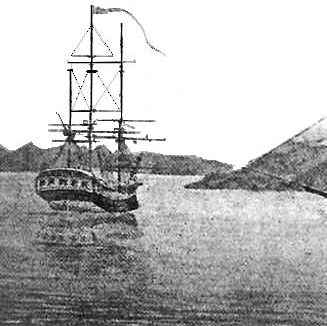
1791 (May 6-17) Countdown to Infamy: American Naval Captains John Kendrick and William Douglas become the first American officials to visit Japan (Kii Oshima Island). Japanese xenophobes immediately express their extreme displeasure, making the visit a very abbreviated affair. Kendrick will report that he had claimed the island for the newly-formed United States and had planted an American flag on his claim, which perhaps helps explain his lack of welcome from the Japanese. Note: The only surviving account of this incident is the American one; the Japanese seem to have paid the Americans so little mind that no record was made of the visit in Japan. (Cullen)
[See: Countdown to Infamy: Timeline to Pearl Harbor.]1875 Birth: William Daniel Leahy: American naval officer who served as personal chief of staff to President Franklin D. Roosevelt during World War II:
Leahy graduated from the United States Naval Academy at Annapolis, Maryland, in 1897 and was assigned as midshipman to the battleship Oregon. He was aboard that warship during its spectacular dash from the Pacific coast around Cape Horn to join the U.S. fleet off Cuba in the spring of 1898, during the Spanish-American War. The following year he was commissioned an ensign and assigned to the Asiatic Station, where he saw active service during the Philippine insurrection (1899–1901) and the Boxer Rebellion in China (1900).
In World War I he commanded the navy transport Princess Matoika and formed a lasting friendship with Roosevelt, then assistant secretary of the navy. After the war Leahy’s ability brought steady professional advancement: rear admiral in 1930, vice admiral in 1935, and admiral in 1936. His talent for organization was early recognized, and during the post-World War I years he held all three of the navy’s highest administrative offices. . . .
Leahy’s first career ended with retirement because of his age in August 1939. His second career began a few months later, when President Roosevelt named him governor of Puerto Rico. He held that post until December 1940, when he was appointed ambassador to the Vichy government that had been established in France after the Germans defeated the French army. There Leahy’s chief task was to stiffen French resistance to German pressure and to keep the French fleet out of German hands. After achieving some success in this difficult assignment, he was recalled in 1942 to fill the newly created position of chief of staff to Roosevelt. As liaison between the president and the armed services, Leahy conferred with Roosevelt daily, presided over the Joint Chiefs of Staff, and participated in almost all the major military and diplomatic decisions of the war years. He was made a fleet admiral in December 1944 and accompanied Roosevelt to the Yalta Conference the following year.
After Roosevelt’s death (April 1945), Leahy was asked by President Harry S. Truman to continue as his personal chief of staff. He retired from that position in 1949, and the following year he published a book of war memoirs, I Was There (1950). (Britannica.com)
1882 Various:
Birth: Crown Prince Wilhelm: Eldest son of Kaiser Wilhelm II, in Potsdam, Prussia:
At the time of Wilhelm's birth Kaiser Wilhelm I was 85 years old, and Otto von Bismarck served as Chancellor.
Although militaristic in manner, Wilhelm had little command experience when the First World War began, although he had trained as an officer at Potsdam at the age of 18. In line however with the German tradition of royal army command, he was given charge of Fifth Army in August 1914 . . . .
Wilhelm was promoted . . . in September 1916, to become head of the newly-created 'Army Group Crown Prince', which comprised the three armies occupying the central section of the German line. In 1917 the Crown Prince tried to persuade the then-Chancellor Bethmann-Hollweg (shortly to be dismissed) to sue for peace, bringing an end to what he regarded as a senseless war. Despite winning a significant German victory at the Aisne in May 1918, Wilhelm realised that defeat was likely following the Allied counter-attack at the Second Battle of the Marne, again recommending a policy of retreat to the Third Supreme Command headed by Paul von Hindenburg and Erich Ludendorff. This was firmly rebuffed.
With the German revolutions of late 1918, Wilhelm resigned from the army and left Germany in exile, following his father to Doorn, Holland on 12 November 1918 (click here to read Wilhelm's denied request to the new government to remain with the army as it returned to Germany). Both Wilhelm II and the Crown Prince were signatories of the formal abdication document.
Wilhelm returned to Germany in November 1923, having given Chancellor Gustav Stresemann assurances that he would not take an interest in political affairs. His joined his wife, Princess Cecilie, who had remained behind in Germany, at their residence in Potsdam (named Cecilienhof, and later used for the post-Second World War Potsdam Conference). He lived the remainder of his life as a private citizen, rebuffing advances from Hitler to endorse his Nazi party.
Crown Prince Wilhelm died on 20 July 1951 of a heart attack in Hechingen.
USA: Chinese Exclusion Act: President Chester A. Arthur signs the Chinese Exclusion Act into law, implementing a ban on Chinese immigration to the United States that remained until the Magnuson Act was enacted in 1943. [For further information, click here.]
1910 Death: Edward VII of the United Kingdom: after a series of heart attacks:
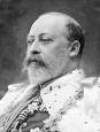
He was born November 9, 1841, eldest son of Queen Victoria. He married Princess Alexandra of Denmark in 1863, who bore him three sons and three daughters.
Victoria, true to the Hanoverian name, saw the worst in Edward. She and Albert imposed a strict régime upon Edward, who proved resistant and resentful throughout his youth. His marriage at age twenty-two to Alexandra afforded him some relief from his mother's domination, but even after Albert's death in 1863, Victoria consistently denied her son any official governmental role. Edward rebelled by completely indulging himself in women, food, drink, gambling, sport and travel. Alexandra turned a blind eye to his extramarital activities, which continued well into his sixties and found him implicated in several divorce cases.
Edward succeeded the throne upon Victoria's death; despite his risqué reputation, Edward threw himself into his role of king with vitality. His extensive European travels gave him a solid foundation as an ambassador in foreign relations. Quite a few of the royal houses of Europe were his relatives, allowing him to actively assist in foreign policy negotiations. He also maintained an active social life, and his penchant for flamboyant accouterments set trends among the fashionable. Victoria's fears proved wrong: Edward's forays into foreign policy had direct bearing on the alliances between Great Britain and both France and Russia, and aside from his sexual indiscretions, his manner and style endeared him to the English populace.
Social legislation was the focus of Parliament during Edward's reign. The 1902 Education Act provided subsidized secondary education, and the Liberal government passed a series of acts benefiting children after 1906; old age pensions were established in 1908. The 1909 Labour Exchanges Act laid the groundwork for national health insurance, which led to a constitutional crisis over the means of budgeting such social legislation. The budget set forth by David Lloyd-George proposed major tax increases on wealthy landowners and was defeated in Parliament. Prime Minister Asquith appealed to Edward to create several new peerages to swing the vote, but Edward steadfastly refused. Edward died amidst the budgetary crisis at age sixty-eight, which was resolved the following year by the Liberal government's passage of the act.
Despite Edward's colorful personal life and Victoria's perceptions of him as profligate, Edward ruled peacefully (aside from the Boer War of 1899-1902) and successfully during his short reign, which is remarkable considering the shifts in European power that occurred in the first decade of the twentieth century.
[While I am an admirer of his late Majesty, I feel that his overtures to the French were misguided. Had he managed a comfortable relationship with Kaiser, it could well be that the UK and the German Empire could have together suppressed the outbreak of the Great War; and thus: no millions slaughtered for no apparent reason, no Third Reich, possibly no USSR, and no communist Eastern Europe.‑‑Ed.]
1910 Accession: George V of the United Kingdom:
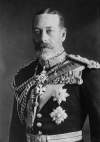
The second son of Edward VII and Alexandra of Denmark was born at Marlborough House on 3rd June, 1865. Most of his childhood was spent at Sandringham, Buckingham Palace, and Balmoral.
After being educated at home . . . George became a naval cadet at Dartmouth. By 1889 he was commander of a torpedo boat. However, in January 1892, his naval career came to an end when his older brother, Prince Edward, died of pneumonia. Edward had been engaged to marry his German cousin, Princes Mary of Teck. It was now decided she should marry George instead.
George was now heir to the throne and it was decided that he could no longer risk his life as a naval commander. He was granted the title, the Duke of York and became a member of the House of Lords. George was also given a political education that included an in-depth study of the British Constitution. However, unlike his father, he did not learn to speak any foreign languages.
George, Duke of York, married Princess Mary in 1893. Mary had six children: Edward VIII (1894-1972), George VI (1895-1952), Mary (1897-1965), Henry, Duke of Gloucester (1900-1974), George, Duke of Kent (1902-1942) and Prince John (1905-1919). . . . .
The outbreak of the First World War created problems for the royal family because of its German background. Owing to strong anti-German feeling in Britain, it was decided to change the name of the royal family from Saxe-Coburg-Gotha to Windsor. To stress his support for the British, the king made several visits to the Western Front. On one visit to France in 1915 he fell off his horse and broke his pelvis.
In 1917 George V took the controversial decision to deny political asylum to the Tsar Nicholas II and his family after the Bolshevik Revolution. People were shocked by George's unwillingness to protect his cousin but his advisers argued that it was important for the king to distance himself from the autocratic Russian royal family. Some people questioned this decision when it became known that the Bolsheviks had executed Tsar Nicholas, his wife and their five children . . . .
The king had not enjoyed good health for a long time and during his final years he spent much of his time on his grand passion, philately. Patriotically, he concentrated on collected stamps from the British Empire.
George V died of influenza on 20th January, 1936. His eldest son, Edward now became king. [But was never crowned.‑‑Ed.]
1915 World War I: Various:

List Regiment: Gefreiter Adolf Hitler's 16 Reserve Infantry Regiment continues occupying a position at Fromelles (pictured above in a drawing by Hitler), which is on a level field with water channels, willow trees and willow stalks. in the distance towards the enemy lines lies an insignificant wood with barbed wire entanglements. Under the direction of their defense-minded commander, Lieutenant General Gustav Scanzoni von Lichtenfels, the regiment works ceaselessly day and night in the subsequent weeks, to further fortify their position at Fromelles. [For further details, Click here.]
From the regimental diary of the 16th RIR: "The sound of the artillery takes on a deeper note."
Second Battle of Krithia, Gallipoli: After the failure of a first attempt to capture the village of Krithia on the Gallipoli Peninsulaon April 28, 1915, a second is initiated on May 6 by Allied troops under the British commander Sir Aylmer Hunter-Weston. [For further details, Click here]
Birth: Orson Welles:
The 1941 feature film Citizen Kane is still thought by many critics to be the best film ever made in America
Of more relevance to this page, however, is The Third Man: set in ruined and Four-Power occupied Vienna, immediately after World War II:
Harry Lime, as realised on the screen by Orson Welles, is one of the great characters in cinema and also one of the most tricky. He exerts a fascination on audiences despite the fact that, in simple plot terms, he's an outright villain. He has sold [adulterated] penicillin on the black market and people, including children with meningitis, have died or been mentally inacapacitated as a result.
When, aboard the Great Wheel, Holly Martins (Joseph Cotten) confronts him with what he's done he brushes the charges away. He looks down at the people below, mere specks from that height, and says: "Would you really feel any pity if one of those dots stopped moving forever? If I said you can have twenty thousand pounds for every dot that stops, would you really, old man, tell me to keep my money . . . . ?"
Welles seems to have regarded this assignment as a lucrative diversion and perhaps this explains why he brought a winning frivolity to Lime, as exemplified in the famous speech he himself wrote or improvised for The Third Man: In Italy for thirty years under the Borgias they had warfare, terror, murder, bloodshed—but they produced Michelangelo, Leonardo da Vinci and the Renaissance. In Switzerland they had brotherly love, five hundred years of democracy and what did that produce? The cuckoo clock!
Welles's performance takes the edge off the corruption in Harry's character: it's not just what he says, though, there are also more subtle shades of performance. In his dramatic first appearance, Harry, smiling in a doorway, is illuminated from above by the light from a window. In this kind of light, Harry could have looked scary and diabolical, like a vampire or a ghoul in a horror film. Instead it's as if a spotlight has been turned on to reveal a music-hall performer, an entertainer: he could almost begin to sing or tap-dance.
In other words there's an element of deception in the way Welles plays Harry. But it's important to remember that his crimes are never glossed over. Major Calloway (Trevor Howard) makes sure of that. The conundrum of The Third Man has to do with why otherwise good people—above all his girlfriend Anna (Alida Valli) but also the film's audienceCitizen Kaneremain loyal to Harry despite what he's done.
Rather than seeing The Third Man as performing a moral sleight-of-hand it might be better to think of it as exploring how emotion and affection often know no morality. The dark implications of this are left essentially unexplored in the film: instead Anna's loyalty is portrayed as a form of personal courage.
In the novella [by Grahame Greene] Harry's power over people has a more malevolent aspect: "A racket works very like a totalitarian party", Calloway says; and this racket's führer is Harry Lime.
1916 World War I: List Regiment: Gefreiter Adolf Hitler endures trench warfare in Flanders (Artois) with 3 Company, 16 Reserve Infantry Regiment. [For further details, Click here.]
1917 World War I: Various: United States formally enters the war:
Two days after the U.S. Senate votes 82 to 6 to declare war against Germany, the U.S. House of Representatives endorses the decision by a vote of 373 to 50.
When World War I erupted in 1914, President Woodrow Wilson pledged neutrality for the United States, a position favored by the vast majority of Americans. Britain, however, was one of America's closest trading partners, and tension soon arose between the United States and Germany over the latter's attempted quarantine of the British Isles. Several U.S. ships traveling to Britain were damaged or sunk by German mines, and, in February 1915, Germany announced unrestricted warfare against all ships, neutral or otherwise, that entered the war zone around Britain. One month later, Germany announced that a German cruiser had sunk the William P. Frye, a private American vessel. President Wilson was outraged, but the German government apologized, calling the attack an unfortunate mistake.
On May 7, the British-owned ocean liner Lusitania was torpedoed without warning just off the coast of Ireland. Of the nearly 2,000 passengers aboard, 1,201 were killed, including 128 Americans. The German government maintained, correctly, that the Lusitania was carrying munitions, but the U.S. demanded reparations and an end to German attacks on unarmed passenger and merchant ships. In August, Germany pledged to see to the safety of passengers before sinking unarmed vessels, but in November a U-boat sank an Italian liner without warning, killing 272 people, including 27 Americans. With these attacks, public opinion in the United States began to turn irrevocably against Germany.
In February 1917, Germany, determined to win its war of attrition against the Allies, resumed its policy of unrestricted submarine warfare in war-zone waters. Three days later, the United States broke diplomatic relations with Germany; the same day, the American liner Housatonic was sunk by a German U-boat. On February 22, Congress passed a $250 million arms-appropriations bill intended to ready the United States for war. In late March, Germany sank four more U.S. merchant ships, and on April 2, President Wilson went before Congress to deliver his famous "war message." Within four days, both houses of Congress had voted in favor of a declaration of war. [For further details, Click here.]
List Regiment: Gefreiter Adolf Hitler's 16 Reserve Infantry Regiment, 3 Company, participate in the Arras action, being redeployed east of Vimy Ridge. [For further details, Click here.]
1918 World War I: List Regiment: Gefreiter Adolf Hitler's 16th RIR is sent back to hold a sector near an earlier position at Laon. [For further details, Click here.]
1919 Paris Peace Conference: Various:
Report of Commission to Determine War Guilt: On the question of the responsibility of the authors of the war, the Commission, after having examined a number of official documents relating to the origin of the World War, and to the violations of neutrality and of frontiers which accompanied its inception, has determined that the responsibility for it lies wholly upon the Powers which declared war in pursuance of a policy of aggression, the concealment of which gives to the origin of this war the character of a dark conspiracy against the peace of Europe. This responsibility rests first on Germany and Austria, secondly on Turkey and Bulgaria. The responsibility is made all the graver by reason of the violation by Germany and Austria of the neutrality of Belgium and Luxemburg, which they themselves had guaranteed. It is increased, with regard to both France and Serbia, by the violation of their frontiers before the declaration of war. [For further details, Click here.]
The Treaty of Versailles was in no fundamental sense success or failure. The accord was merely another chapter in the long history of multilateral peace conferences summoned to terminate multilateral wars, a history which extends from 1648 to the annual summits of the dominant industrial powers of our day and conveys an impression of extensive efforts succeeded by major failures. The large cast and the large agenda, rather than ill will or outright incompetence, may account for the shortcomings of these grand affairs.
German Delegates' Protest Against Proposed Peace Terms: We came to Versailles in the expectation of receiving a peace proposal based on the agreed principles. We were firmly resolved to do everything in our power with a view of fulfilling the grave obligations which we had undertaken. We hoped for the peace of justice which had been promised to us. We were aghast when we read in documents the demands made upon us, the victorious violence of our enemies. The more deeply we penetrate into the spirit of this treaty, the more convinced we become of the impossibility of carrying it out. The exactions of this treaty are more than the German people can bear. [For further details, Click here.]
1921 Birth: Erich Fried: German essayist and broadcaster, also known for his politically inspired poetry. Born to Jewish parents in Vienna, he fled with his mother to London after his father's murder by the Gestapo following the Anschluss with Nazi Germany. [For further details, Click here.]
1933 Various:
Holocaust: Mixed marriages: The Reich Minister of Justice, Guertner, speaks to his colleagues in state governments: "I should like to ask you all to consider whether you can envisage any legislative procedure whereby we can prevent marriages of mixed race." (THP)
Holocaust: Teachers dismissed under the Law for the Restoration of the Civil Service now lose their licenses to teach or lecture. (THP)
FDR creates the WPA:
President Franklin D. Roosevelt signs an executive order creating the Works Progress Administration (WPA). The WPA was just one of many Great Depression relief programs created under the auspices of the Emergency Relief Appropriations Act, which Roosevelt had signed the month before. The WPA, the Public Works Administration (PWA) and other federal assistance programs put unemployed Americans to work in return for temporary financial assistance. Out of the 10 million jobless men in the United States in 1935, 3 million were helped by WPA jobs alone. [For further details, Click here]
1934 From a speech delivered in Washington by Secretary of State Hull: Today numerous nations are feverishly arming. They are taxing all of their citizens beyond the limit of ability to pay, and in many ways developing a military spirit which, regardless of present motives of self-defense, may probably lead to war, unless past human experience is to be reversed. Every Christian nation owes it to itself and to humanity to preach and promote understanding, friendship, and peace. While there are no signs of immediate war anywhere, it is true that seriously volcanic conditions exist in many parts of the world. Peace stabilization is all-important at this stage. [For the full text, Click here.]
1937 The Hindenburg disaster:
On this day in 1937, the German airship Hindenburg, the largest dirigible ever built, explodes as it arrives in Lakehurst, New Jersey. Thirty-six people died in the fiery accident that has since become iconic, in part because of the live radio broadcast of the disaster.
The dirigible was built to be the fastest, largest and most luxurious flying vessel of its time. It was more than 800 feet long, had a range of 8,000 miles, could carry 97 passengers and had a state-of-the-art Mercedes-Benz engine. It was filled with 7 million cubic feet of hydrogen, even though helium was known to be far safer, because it made the flying ship more maneuverable.
The Hindenburg had made 10 successful ocean crossings the year before and was held up by Germany's Nazi government as a symbol of national pride. Flying at a speed of 85 miles per hour, the Hindenburg was scheduled to arrive in New Jersey at 5 a.m. on May 6. However, weather conditions pushed the arrival back to the late afternoon and then rain further delayed the docking at Lakehurst. When the dirigible was finally cleared to dock, Captain Max Pruss brought the ship in too fast and had to order a reverse engine thrust. At 7:20 p.m., a gas leak was noticed. Within minutes, the tail blew up, sending flames hundreds of feet in the air and as far down as the ground below.
A chain reaction caused the entire vessel to burn instantly. The nearly 1,000 spectators awaiting the Hindenburg's arrival felt the heat from a mile away. Some on the blimp attempted to jump for the landing cables at the docking station but most died when they missed. Others waited to jump until the blimp was closer to the ground as it fell. Those who were not critically injured from burns often suffered broken bones from the jump. Fifty-six people managed to survive.
On WLS radio, announcer Herbert Morrison gave an unforgettably harrowing live account of the disaster, "Oh, oh, oh. It's burst into flames. Get out of the way, please . . . this is terrible . . . it's burning, bursting into flames, and is falling . . . . Oh! This is one of the worst . . . it's a terrific sight . . . oh, the humanity."
1940 World War II: Romania: Horia Sima a young Romanian Legionary (Iron Guard) leader leaves Berlin with a group of comrades and secretly enters Romania.
1941 World War II: Various:
Yugoslavia: The German air force launches Operation Castigo, the bombing of Belgrade, as 24 divisions and 1,200 tanks drive into Greece. The attack on Yugoslavia was swift and brutal, an act of terror resulting in the death of 17,000 civilians: the largest number of civilian casualties in a single day since the start of the war. Making the slaughter all the worse was that nearby towns and villages had emptied out into the capital city to celebrate Palm Sunday. All of Yugoslavia's airfields were also bombed, destroying most of its 600 aircraft while still on the ground. [For further details, Click here.]
Ethiopia: British General Alan Cunningham's troops enter Ethiopia's capital, Addis Ababa, formally expelling the Italian occupiers and setting the stage for the return of Ethiopia's emperor, Haile Selassie. [For further details, Click here.]
Entertainment: American entertainer Bob Hope performs the first of his many shows for the United Service Organizations. [For further information, click here.]
1942 World War II: Philippines: Unconditional surrender of all American forces:
U.S. Lieutenant General Jonathan Wainwright surrenders all U.S. troops in the Philippines to the Japanese.
The island of Corregidor remained the last Allied stronghold in the Philippines after the Japanese victory at Bataan (from which General Wainwright had managed to flee, to Corregidor). Constant artillery shelling and aerial bombardment attacks ate away at the American and Filipino defenders. Although still managing to sink many Japanese barges as they approached the northern shores of the island, the Allied troops could hold the invader off no longer. General Wainwright, only recently promoted to the rank of lieutenant general and commander of the U.S. armed forces in the Philippines, offered to surrender Corregidor to Japanese General Homma, but Homma wanted the complete, unconditional capitulation of all American forces throughout the Philippines. Wainwright had little choice given the odds against him and the poor physical condition of his troops (he had already lost 800 men). He surrendered at midnight. All 11,500 surviving Allied troops were evacuated to a prison stockade in Manila.
General Wainwright remained a POW until 1945. As a sort of consolation for the massive defeat he suffered, he was present on the USS Missouri for the formal Japanese surrender ceremony on September 2, 1945. He would also be awarded the Congressional Medal of Honor by President Harry Truman. Wainwright died in 1953: exactly eight years to the day of the Japanese surrender ceremony. (History.com)
1945 World War II: Various: Churchill to Truman:
It seems to me that matters can hardly be carried further by correspondence, and that as soon as possible there should be a meeting of the three heads of Governments. Meanwhile we should hold firmly to the existing position obtained or being obtained by our armies in Yugoslavia, in Austria, in Czechoslovakia, and on the main central United States front, and on the British front, reaching up to Luebeck, including Denmark. There will be plenty to occupy both armies in collecting the prisoners during the next few days, and we hope that the VE celebration will also occupy the public mind at home. Thereafter I feel that we must most earnestly consider our attitude toward the Soviets and show them how much we have to offer or withhold. The Prague Offensive: the last major battle of the Eastern Front, begins. During the battle, Prague was liberated, and the troops of Army Group Center who had not surrendered after the capitulation of Germany were captured (850,000). Kaltenbrunner's wife: An Allied CIC team working with the US 80th Division's 319th Regiment arrest Ernst Kaltenbrunner's wife on an estate in the Austrian town of Strobl. Under interrogation, she informs them that her husband had been with her as recently as May 3. Note: Kaltenbrunner will be captured on May 12 and ultimately be sentenced to death for War Crimes at Nuremberg. World War II: Constantin von Neurath is arrested in the French occupation zone: the only Nuremberg defendant captured by the French. Note: The Americans now have ten defendants in custody, the British five, while three are in joint US/UK custody. The Soviets hold only two as most Germans much prefer to surrender to the British or Americans. Only the dimmest, or most unlucky, of them are captured by the Red Army. When the war finally ended, the fate of the German General Staff, once so mighty, resembled the collective fate of the Emperors of Byzantium. During his twelve years as Fuehrer, Hitler created twenty-six Field Marshals and Grand Admirals. Few escaped his own fury, and those who did survive did not escape the retribution of the Grand Alliance. All either were shot, committed suicide, were compelled to commit suicide, or were jailed by the Allies. The Chiefs of the General Staff fared no better. All suffered similar ends. Of the estimated 2,500 generals of the Wehrmacht, 786 are known to have died in the war. Of these, 253 were killed in action, 44 died of wounds, 61 committed suicide, 23 were executed by Hitler, 41 were executed by the Allies for war crimes, and 326 died of other or unknown causes. Those captured by the Americans or the British were imprisoned; of those captured by the Russians, many died in jail. Czechoslovakia: The US Third Army captures Pilsen Netherlands: General Johannes Blaskowitz surrenders the German armies. SS resistance: Admiral Karl Doenitz issues an order forbidding further resistance by the SS.
Wilhelmshaven: The 1st Polish Armored Division hoists flag over Wilhelmshaven, the main German U-boat base.
Axis Sally: last propaganda broadcast to Allied troops (first was on December 11, 1941).
Burma: Aircraft from four British carriers attack Japanese bases between Mergui and Victoria Point.
War in the Pacific: British battleships and cruisers shell Port Blair in the Andaman Islands.
1946
Dr. Sauter: Dr. Funk, I have another question. Perhaps, despite your poor state of health today, you might be able to speak a little more loudly so that the stenographers might understand you more easily. Please try, and we will make this as brief as possible. From the letters of Thomas Dodd: Today I cross-examined Funk—and feel it went very well—everyone here seemed very pleased about it. I am told the American press was quite enthusiastic. We will see what the reaction is. At closing time today I had not finished so I will wind it up tomorrow morning. I do enjoy cross-examination and I had Funk pretty well carved up at closing time. (I guess that sounds a little boastful.)
1974 West Germany: Chancellor Willy Brandt resigns after an aide is arrested on charges of spying for East Germany.
1979 Austria: General Election: Dr. Bruno Kreisky's Socialist Democratic Party is returned to power for a fourth consecutive term.
1983 The Hitler Diaries—supposedly written by dictator Adolf and published by Stern Magazine and the Sunday Times—are declared fakes. It will eventually be discovered that the bogus diaries were created by East German forger Konrad Kujau. Rupert Murdock will be among those who are fooled into paying milions for the rights to publish them. The Hitler Diaries incident has been called the greatest literary hoax of all time. The Federal Archive officially announced that the Hitler diaries were flagrant and worthless forgeries and by no means the work of Adolf Hitler. Tests proved that the paper, ink and glue of the diaries was undoubtedly manufactured post World War II. Thus, the diaries had been made sometime after Hitler's death. Handwriting analysis further verified that the diaries were fakes. 1992 Various:
Death: Marlene Dietrich: German-born actress, entertainer and singer. Dietrich was known to have strong political convictions and the mind to speak them. Like many Weimar era German entertainers, she was a staunch anti-Nazi who despised anti-Semitism. In 1941, the U.S. entered the Second World War and Dietrich became one of the first celebrities to raise war bonds. She recorded and sang "Lili Marlene," a song that was popular with the troops of both the Axis and the Allies, and by its popularity defeated Goebbels' attempts to suppress it. Dietrich also recorded a number of anti-Nazi records in German for the OSS. She entertained troops on the front lines in a USO revue that included future TV pioneer Danny Thomas as her opening act and also played the musical saw to entertain the troops. She sang for them on the front lines in Algiers, France and into Germany with Generals James M. Gavin and George S. Patton. When asked why she had done this, in spite of the obvious danger of being within a few kilometers of German lines, she replied, "aus Anstand"—"it was the decent thing to do." Dietrich was awarded the Medal of Freedom by the US Government for her war work.
Gorbachev reviews the Cold War: In an event steeped in symbolism, former Soviet leader Mikhail Gorbachev reviews the Cold War in a speech at Westminster College in Fulton, Missouri—the site of Winston Churchill's "Iron Curtain" speech 46 years before. Gorbachev mixed praise for the end of the Cold War with some pointed criticisms of U.S. policy. [For further details, Click here.]
1994 English Channel tunnel opens:
In a ceremony presided over by England's Queen Elizabeth II and French President Francois Mitterand, a rail tunnel under the English Channel was officially opened, connecting Britain and the European mainland for the first time since the Ice Age. [For further details, Click here.]
Edited by Levi Bookin (Copy editor) Click to join 3rdReichStudies Please note that the list-owner and the moderator are not responsible for, and do not necessarily approve of, the random ads placed on our pages by our web server. They are, unfortunately, the price one pays for a 'free' website. FAIR USE NOTICE: This site may contain copyrighted material the use of which has not always been specifically authorized by the copyright owner. We are making such material available in our efforts to advance understanding of historical, political, human rights, economic, democracy, scientific, environmental, and social justice issues, etc. We believe this constitutes a 'fair use' of any such copyrighted material as provided for in section 107 of the US Copyright Law. In accordance with Title 17 U.S.C. Section 107, the material on this site is distributed without profit to those who have expressed a prior interest in receiving the included information for research and educational purposes. If you wish to use copyrighted material from this site for purposes of your own that go beyond 'fair use', you must obtain permission from the copyright owner.
The Paris Peace Conference fits this scenario. It was convened to resolve the problems accumulated by a war that had lasted far longer and had been more costly than anyone had expected. Some of these problems antedated 1914 by centuries. Poland, for instance, had figured among European diplomatic preoccupations ever since that monarchy had become elective, certainly since 1696. Military and diplomatic attempts to contain hegemonial ambitions had likewise arisen numerous times before 1919. I need only remind you of the congresses at Utrecht (1713) and Vienna (1814/15), convened to liquidate the imperialist pretensions first of Louis XIV and then of Napoleon Bonaparte. Let me also recall that each of these attempts at making peace brought to the bargaining table alliances of divergent interests whose solidarity began to disintegrate as soon as victory was won.
Let us, however, not forget that the war which the participants of the Paris Peace Conference had fought differed from its most immediate predecessors. Frederick the Great's armies numbered tens of thousands; Napoleon led an unprecedented half mil1ion men to disaster in Russia; and the wars of the nineteenth century engaged armies of one to two hundred thousand at most. Now millions battled on many fronts in engagements lasting not days, but months. World War I had been a democratic war, not only because of the incidence of representative institutions among belligerent governments, but because it enlisted soldiers and civilians of both genders. While young males reported for combat, fathers and grandfathers, wives, sisters, girl friends and mothers, took over the farms, operated the machinery of sophisticated manufacture, and ran public utilities. These non-combatants were also involved in the fray as taxpayers and subscribers to war bonds. Economic mobilization was as essential to the war effort as was the military.
The comprehensive and unprecedented marshaling of all resources imposed more sacrifices as the war turned from the expected quick romp to victory into a four-year battle of attrition. Living standards declined, food grew critically short, and disease stalked town and country as both physicians and medicines became scarce. Nor were these proliferating hardships distributed equally. War industries nourished, paying wages that kept pace with inflation. However, other pursuits, such as building and construction, practically ceased. Less visible injustices multiplied, often in unpredictable ways. J�rgen Kocka's seminal study of Germany's home front documents, for instance, how the deterioration of civil service income hit upper echelons harder than lower classifications. Different degrees of victimization bred not only different levels of disaffection, but turned the disaffected against fellow citizens whom they perceived as suffering less or even profiting from the conflict. On a broad front, farmers resented governmental control of prices and distribution for the sake of hungry city dwellers. Townspeople saw farmers as war profiteers charging exorbitant prices for their crops, while they patriotically labored in the arms factories. As a result of these increasingly bitter divisions, the nation was in danger of becoming a victim of the very war fought to preserve it. Recent research contesting the traditional notion that war unifies a people has so far been confined to local and national case studies, but a grand synthesis, revealing war as a destroyer of national unity, will, I am sure, be written some day and will rest on a surfeit of evidence. [For further details, Click here.]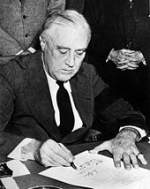


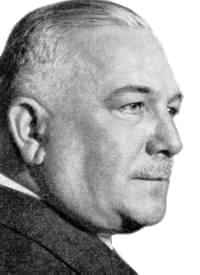
The toll among the SS generals was even greater. Thirty-two were killed in action; four died of their wounds; two were executed by Hitler for treason; fourteen were executed by the Allies for war crimes; five died from unrecorded causes; nine died from natural causes while on duty; eight died in jail; four were executed by the West German government; and sixteen committed suicide. Thus ninety-four of the generals of the inner cabal of Nazism died, from all causes, but most significant was the number of suicides—the ultimate signal of fear and despair—both in the Army and the SS. Ninety-seven German generals died by their own hands. In the Kaiser's war, Germany lost 63 generals in combat and 103 through other causes; only 3 committed suicide.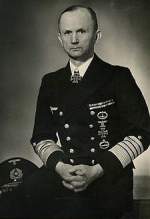
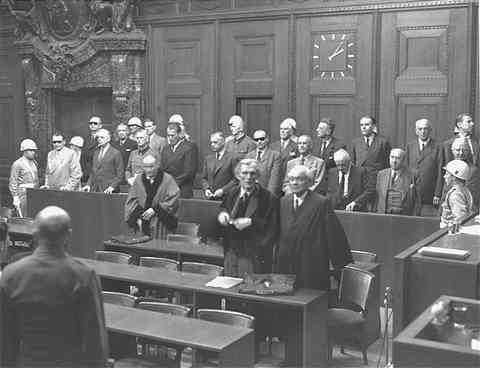
Witness, then in addition to these offices of yours which we have discussed up to now, you finally had a further office as successor of Dr. Schacht, namely, that of Plenipotentiary General for Economy. Can you give us some details of your view in this connection in order to clarify your situation, your activity, and your achievements?
Funk: This of all the positions I had was the least impressive. As the Reich Marshal correctly stated, and as Dr. Lammers confirmed, it existed merely on paper. [For the rest of Funk's testimony, Click here.]
Stern executives initially handled the news of the forgery with disbelief. They could no longer escape the painful truth that they had been swindled. Almost immediately after the news of the bogus diaries had become public, several people in Stern's editorial department resigned or were fired from their positions, including Heidemann [Gerd Heidemann, a Nazi enthusiast who was employed as an investigative journalist for Stern; he was responsible for acquiring the 'Diaries' for Stern]. In fact, the founder and publisher of Stern, Henri Nannen, filed fraud charges against Heidemann in Hamburg, Germany, three days after the news that the diaries were forgeries.
Although it was speculated that Heidemann was one of the primary perpetrators of the scam, few believed he acted alone. The publishing company and the police immediately began an investigation to find out who else may have been involved in the hoax. At the time, Konrad Kujau's identity had not yet been discovered. However, he knew his time of anonymity was quickly coming to an end. [For further details, Click here.]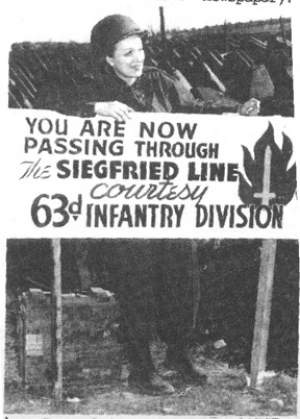

levi.bookin@gmail.com







